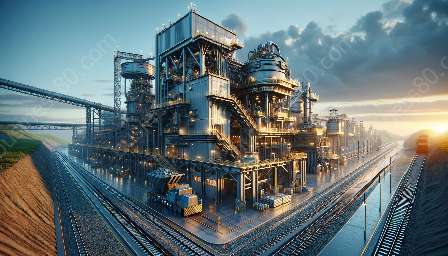Ferrous metallurgy holds a pivotal role in the world of metallurgy, impacting the metals & mining industry. Explore the history, processes, and significance of ferrous metals.
Understanding Ferrous Metallurgy
Ferrous metallurgy involves the study and application of iron and its alloys. These ferrous metals, primarily iron and steel, are essential to modern industry and infrastructure. From the ancient civilizations to the modern era, ferrous metallurgy has played a crucial role in the development of human society.
Historical Significance
The history of ferrous metallurgy dates back thousands of years, with ancient civilizations such as the Hittites and Egyptians mastering the art of iron smelting. Iron tools and weapons revolutionized warfare and agriculture, shaping the course of history. The Industrial Revolution further propelled ferrous metallurgy, leading to mass production of steel and the rise of modern industrial societies.
Processes and Technologies
Ferrous metallurgy encompasses a range of processes and technologies, from iron ore mining and smelting to steel production and alloying. Iron ores are extracted from the earth, then refined and transformed through various methods such as the blast furnace and the electric arc furnace. Alloying elements are added to iron to create a myriad of steel types, each with unique properties suited for specific applications.
Significance in Modern Industry
Ferrous metals are indispensable in modern industry, with steel being the backbone of construction, transportation, and manufacturing. From towering skyscrapers to automotive components, ferrous metallurgy underpins the infrastructure and products that define our daily lives. Furthermore, advancements in metallurgical research continually enhance the properties and sustainability of ferrous metals, ensuring their continued relevance in the 21st century.
Impact on Metals & Mining
The extraction and processing of ferrous metals are integral to the metals & mining industry. Iron ore mining operations form a significant part of the global mining sector, driving economies and employment. The processing of ferrous metals involves intricate metallurgical techniques and innovative technologies, contributing to the advancement of the metals & mining industry as a whole.
Conclusion
Ferrous metallurgy stands as a testament to human ingenuity and industry, shaping civilizations and industries throughout history. Its influence on metallurgy and the metals & mining industry continues to expand, driving innovation and progress in the modern world.

